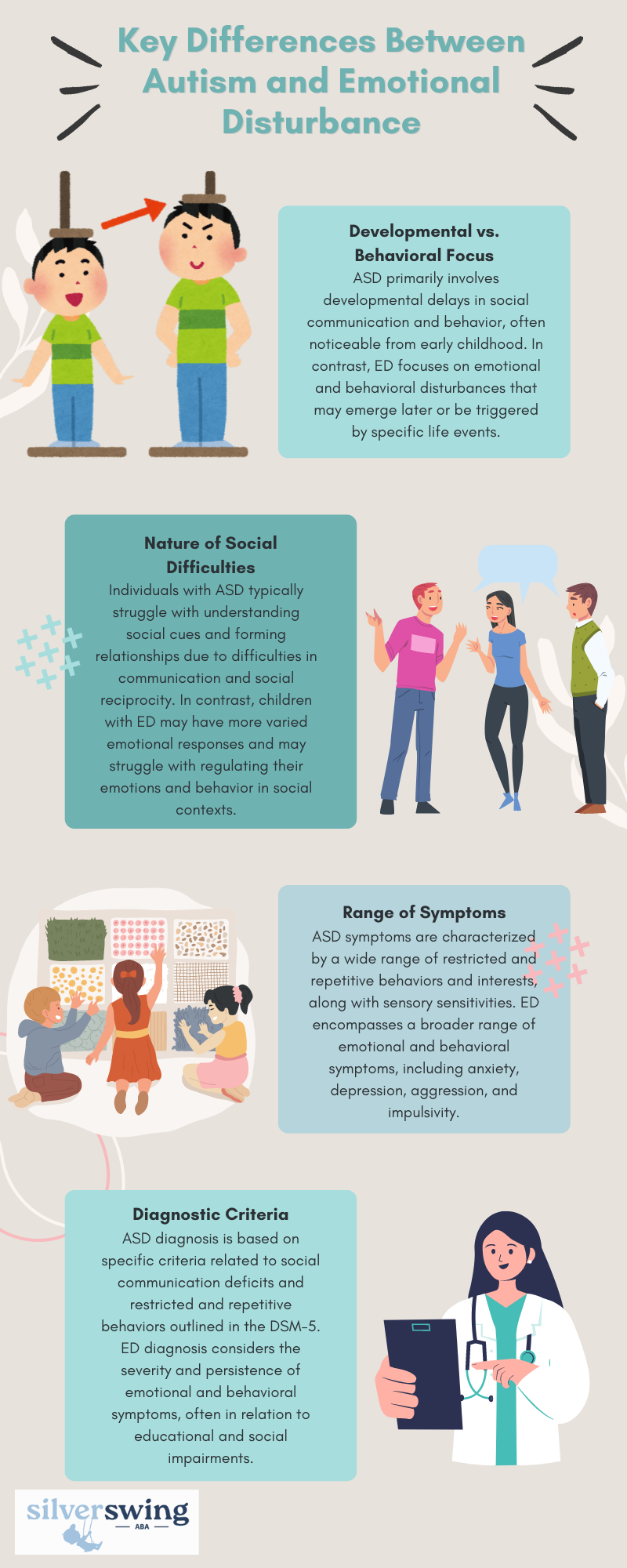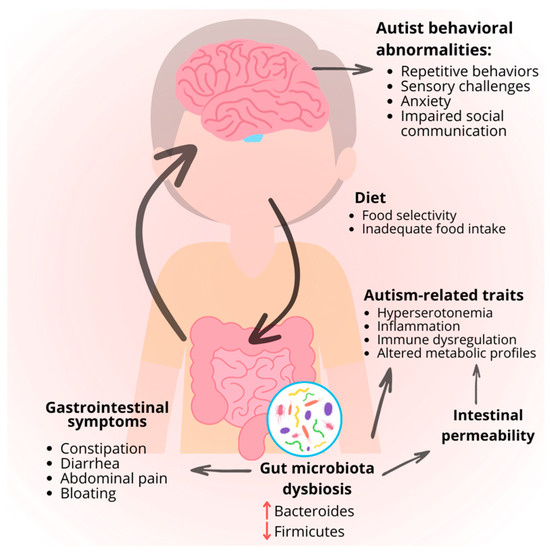Essential checklist for working with Autism Spectrum Therapies providers
Wiki Article
Comprehending the Effect of Behavioral Autism on Life and Social Communications
You might not understand exactly how deeply behavioral autism influences everyday life and social communications. People on the spectrum usually navigate a globe filled up with interaction difficulties and sensory overload. These challenges can lead to irritation and isolation, impacting their partnerships and total health.Specifying Behavior Autism and Its Features
Behavioral autism, usually described as autism spectrum problem (ASD), incorporates a variety of conditions characterized by challenges in social communication, communication, and repetitive actions. You might discover that people with ASD frequently have a hard time to interpret social signs, which can lead to misconceptions in discussions. They may discover it hard to establish eye contact or participate in small talk, making social circumstances really feel frustrating.Communication difficulties can materialize in different means, from delayed speech development to a preference for making use of less words. By identifying these traits, you can foster an atmosphere that promotes acceptance and encourages effective communication, helping people with autism flourish in their day-to-day communications.
The Spectrum of Autism: Understanding Variability in Behavior
Autism range problem (ASD) isn't a one-size-fits-all medical diagnosis; it differs commonly among individuals. You could see that some individuals with ASD display moderate symptoms, while others may encounter a lot more considerable difficulties. This variability can manifest in behaviors, interests, and sensory level of sensitivities. You might come across individuals that are extremely verbal and involve quickly in conversations, while others could prefer singular tasks or communicate non-verbally.Additionally, the means people with ASD react to sensory input can differ significantly; some might be bewildered by loud sounds or brilliant lights, whereas others grow in promoting settings. The spectrum likewise consists of differences in social communications; some people may battle to analyze social cues, while others browse social setups with loved one ease. Comprehending this irregularity is vital, as it assists you value each person's one-of-a-kind experience and tailor assistance to their details needs, cultivating a more inclusive setting for everyone.
Communication Difficulties Encountered by Individuals With Autism
When you engage with people on the autism spectrum, you may notice their special interaction challenges. They typically encounter difficulties with both verbal and nonverbal hints, which can influence their social interactions. Understanding these barriers is crucial for fostering better links and support.
Verbal Communication Problems
Many individuals on the autism spectrum experience verbal communication difficulties that can substantially affect their day-to-day communications. You could find it challenging to express your thoughts, sensations, or requires plainly. This can bring about aggravation for both you and those around you, as misunderstandings happen. You may have a hard time with starting conversations, maintaining a topic, or understanding nuances in speech. Frequently, you might choose utilizing easy language or repetitive phrases, which can limit your capacity to take part in deeper discussions. Your volume, tone, or rate may not line up with social expectations, causing others to misinterpret your intentions. Identifying these obstacles can assist you and your support network develop approaches to enhance communication and foster better links with others in your life.Nonverbal Interaction Barriers
Spoken interaction isn't the only obstacle people on the autism spectrum face; nonverbal interaction barriers can be simply as significant. These challenges can lead to misunderstandings or misconceptions of social signs, making communications really feel frustrating or confusing. By addressing nonverbal communication, you can find approaches to boost your social experiences and boost your general high quality of life.Social Interaction Impacts
Social communications can frequently feel frustrating due to the one-of-a-kind interaction challenges faced by individuals with autism. You might have problem with interpreting social signs, making it tough to recognize mockery or body movement. This can result in misunderstandings or awkward minutes in discussions. In addition, launching and keeping discussions may really feel tough, triggering stress and anxiety in social situations. You might like structured settings, making spontaneous interactions uncomfortable. It's additionally typical to experience difficulty in taking part in tiny talk, which can impede forming brand-new relationships. Identifying these obstacles can aid you find approaches to enhance communication, such as exercising social skills in secure setups or using aesthetic aids - Aba Therapist Near Me. Comprehending your needs permits you to navigate social communications with greater self-confidence and ease.Social Communication and Relationship Structure in Autism
While structure relationships can be challenging for people with autism, recognizing their distinct viewpoints and interaction styles can promote purposeful links. You might discover that lots of people on the spectrum choose straight interaction and might deal with social cues or little talk. By being uncomplicated in your communications, you can help create an atmosphere where they feel comfortable.Put in the time to listen and observe exactly how they express themselves. This insight can direct you in steering discussions a lot more properly. Taking part in shared interests can also serve as a bridge to much deeper connections. Whether it's a leisure activity, a favorite show, or a mutual enthusiasm, these typical threads can open doors to friendship.
Every Day Life Routine: Navigating Challenges and Techniques
Navigating day-to-day life routines can be particularly testing for individuals with autism, specifically when unforeseen adjustments happen. To navigate these difficulties, consider carrying out visual timetables or checklists.Establishing a regimen that includes sensory breaks can additionally be useful. You can plan brief breaks throughout your day to recharge. It's necessary to communicate with those around you, allowing them recognize your demands and preferences. This aids create an understanding setting.
Lastly, method mindfulness techniques to handle stress and stress and anxiety. Basic breathing exercises or grounding methods can make a significant difference. By integrating these approaches, you can enhance your daily routine and decrease disruptions, making life feel a lot more workable.
Staminas and Capacities of People on the Autism Spectrum
Recognizing day-to-day live regimens is simply one facet of the autism experience. Numerous individuals on the autism spectrum possess amazing toughness and capacities that set them apart. You might locate that your interest to information is phenomenal, enabling you to succeed in jobs that call for accuracy and emphasis. Your capacity to assume outside package can bring about ingenious options in different circumstances.Moreover, your memory abilities often shine, specifically in locations of rate of interest. Autism Behavioral Therapy. This propensity for maintaining details can make you a valuable resource in areas like innovation, science, or art. You might likewise show solid aesthetic reasoning, enabling you to picture complex ideas and solve troubles artistically
Additionally, your distinct perspective read what he said on the world can cultivate empathy and understanding Extra resources in others, enhancing social interactions. Welcoming these strengths not only improves your self-confidence however additionally helps others value the varied talents you give the table.
Creating Inclusive Environments for People With Autism
Producing inclusive settings for individuals with autism begins with designing sensory-friendly spaces that accommodate their special needs. You can additionally cultivate opportunities for social interaction, helping to build links and friendships. By making these modifications, you'll contribute to a much more inviting atmosphere for everybody.Creating Sensory-Friendly Spaces
While making sensory-friendly rooms, it's important to reflect on the special demands of individuals with autism. Begin by picking calming shades and soft lights to create a calming setting. When overwhelmed, integrate silent areas where people can retreat and recharge. You'll intend to reduce loud sounds and interruptions, using soundproof materials or white noise equipments to help keep harmony. Consider responsive elements like soft materials or fidget-friendly things that can provide convenience. Establish that areas are flexible, permitting easy rearrangement to accommodate various activities. Finally, consist of aesthetic timetables or clear signs to assist people navigate the area confidently. By thoughtfully incorporating these aspects, you can develop a welcoming environment that supports sensory requirements and promotes total wellness.Promoting Social Communication Opportunities
Creating sensory-friendly areas not only addresses individual convenience yet additionally sets the stage for purposeful social interactions among people with autism. Encourage peer mentoring, coupling people with autism with supportive peers that can lead them with social scenarios. By executing these techniques, you can boost social possibilities, aiding people with autism develop relationships and reinforce their social abilities in a risk-free, welcoming environment.
Regularly Asked Inquiries
Exactly How Can Friends Support Somebody With Behavioral Autism?
You can sustain a good friend with behavior autism by being client, listening actively, and respecting their borders. Take part in tasks they take pleasure in, connect openly, and develop a comfy environment where they feel valued and understood.What Resources Are Readily Available for Moms And Dads of Kid With Autism?
You can check out various sources for moms and dads of children with autism, including assistance teams, instructional web sites, and regional community solutions. Getting in touch with other parents can also offer important understandings and shared experiences to help navigate difficulties.
Can Behavioral Autism Change In Time?

Yes, behavioral autism can transform gradually. You might notice changes in interaction, social abilities, and behavior as your child expands. Early treatment and support often play vital functions in these developmental adjustments.
Exactly How Do Sensory Sensitivities Affect Life?
Sensory sensitivities can make daily experiences overwhelming. You might battle with bright lights or loud sounds, bring about tension or avoidance. Locating settings that accommodate your needs can substantially enhance your convenience and general day-to-day live.What Prevail Misconceptions Concerning Behavioral Autism?
You might think behavior autism just impacts interaction skills, but it's more complex. Several assume individuals do not have compassion or knowledge, which isn't real. Understanding these mistaken beliefs aids foster approval and support for those on the range.Behavior autism, frequently referred to as autism range condition (ASD), includes an array of conditions identified by obstacles in social communication, interaction, and repeated habits.Social interactions can often really feel frustrating due to the one-of-a-kind communication obstacles encountered by people with autism.Creating sensory-friendly rooms not only addresses private convenience yet likewise sets the stage for my link meaningful social interactions among people with autism. Motivate peer mentoring, matching individuals with autism with encouraging peers who can lead them with social situations. By implementing these techniques, you can boost social chances, aiding people with autism develop friendships and strengthen their social abilities in a secure, welcoming atmosphere.
Report this wiki page